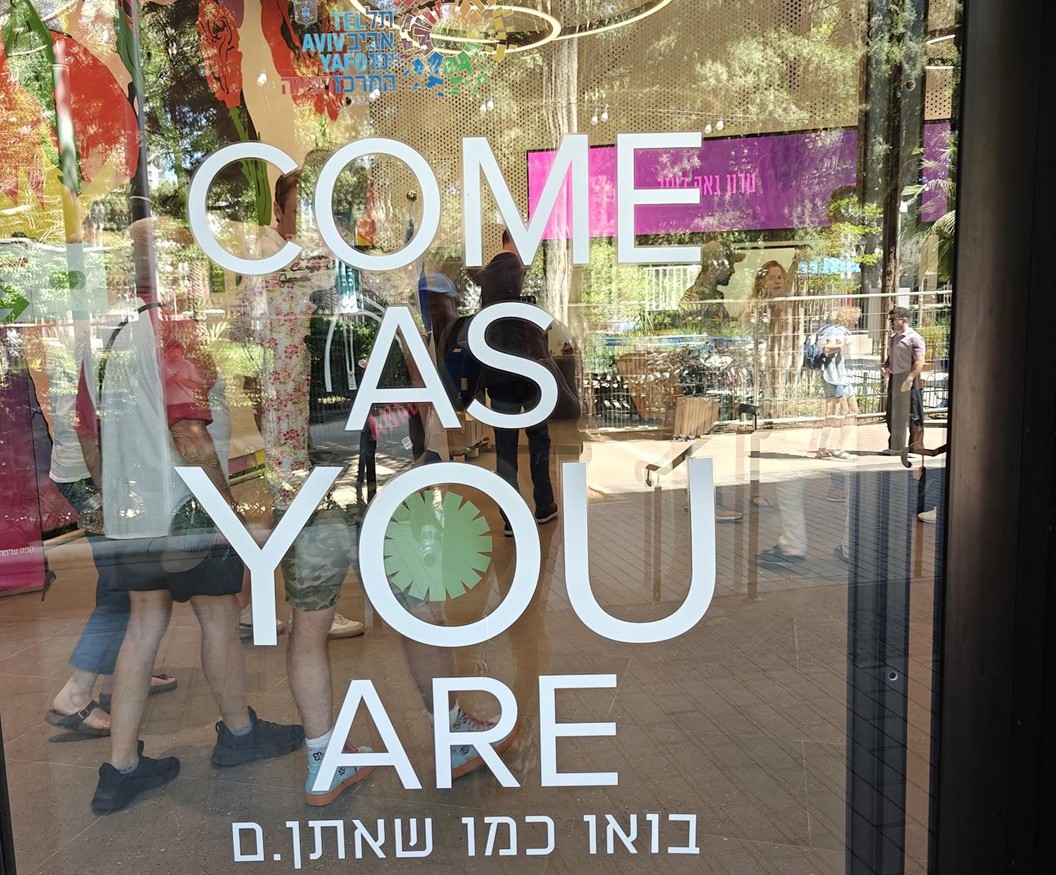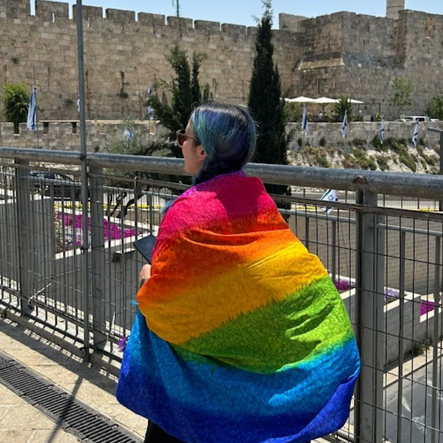
By Maddy Eisenberg
I got an email in the middle of May that I couldn’t quite believe. I had been chosen as a thought leader to join a North American delegation of around a dozen people for a week-long trip to Israel, sponsored by the Ministry of Foreign Affairs. There was no question in my mind that this trip needed to happen - I had been wanting to return since my Birthright trip 11 years ago. As I packed my bags in excitement, my family wished me well, reminding me gently of the ongoing war in the Gaza Strip and the safety risks associated with it.
No one - not even the Israeli locals - could have predicted a new, immediately threatening war would break out a few days after we arrived.
After we all landed in Israel from different cities across North America, we got to know each other over a welcome dinner that included a presentation on the geopolitical context of the war with Gaza. As we ate in a quiet corner of a restaurant filled with stonework, bookshelves, and good company, I learned more about the team I would be travelling with. Chicago. New York. Toronto. Houston. A lawyer who is not Jewish but wanted to come here and advocate for us. A trailblazer who advocates for gay rights in the armed forces. A renowned stand-up comedian, actor, TV writer, author, and activist. All of these people in our delegation are part of the LGBTQ+ community, most are Jewish, and each of us comes from a completely unique life path.
It hadn’t even been 24 hours, and the trip was already proving to be beneficial. My goal for the trip was to meet new people, learn from locals, gather personal stories from an active war zone, and bring all of this back to Canada to combat skewed information from the media on how Israelis are navigating this complex event - both Jewish and non-Jewish Israeli citizens (the world’s understanding of the religious demographic of Israel is a swath of misinformation in its own right.)
The next three days of the trip were jam-packed. Early wake-ups and lots of walking. Like every place in the world, certain population groups do not accept queer people. That became quite apparent while walking through the Old City in Jerusalem. In stark contrast to somewhere like the U.S., however, we knew that the government was not setting out to erase our rights and identities. We felt safe.
The queer history in Israel is what really surprised me. I knew queer folks were tolerated, but I did not know they were celebrated. In conversations at restaurants and in the streets of both Jerusalem and Tel Aviv, there was a beautiful undertone of inclusivity, even more so than in Canada. They understand that pride knows no boundaries; an individual is accepted in their entirety.
We toured Pride Houses to hear more about the queer experience from the mouths of citizens. We learned about the progress made for queer folks, and how far they still have to go in certain policy areas. Weaved into these conversations were harrowing stories of war. We visited a kibbutz right beside the border with Gaza that was affected by October 7. We went to the site of the Nova Festival attack, listening to a woman named Mazel who narrowly escaped death as terrorists rampaged the festival, murdering people who just wanted to dance. We heard from a man whose fiancée died fighting off Hamas, tearfully recounting how flowers that would have been used for their wedding suddenly became used for his funeral.
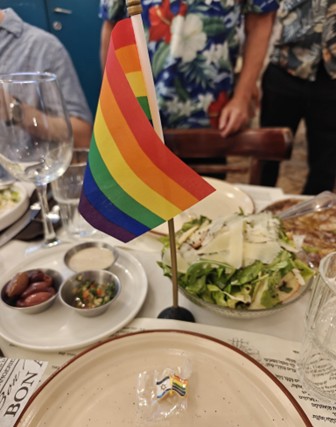
My heart ached during these conversations for two reasons. The contents of these discussions, which are mostly too gruesome to recount in detail, but also because I wished everyone could experience these same moments, especially those who refuse to believe the atrocities of October 7. I was happier than ever to have these stories catalogued.
(at left: A photo from Jerusalem. Pictured is a pride-themed setup that we were welcomed with. It included pride flags and a pride pin. Photo: Maddy Eisenberg; at right: A sign outside the Pride House in Be’er Sheva. Photo: Maddy Eisenberg)
On one of our final nights in Jerusalem, there was an alert sent to our phones of an incoming rocket. This was a first for us, but we all knew what to do. We walked calmly to the shelter, and emerged ten minutes later to see smoke from the interception painting the clear blue sky. We were a little shaken, but figured that would happen only once or twice more for the remainder of our trip.
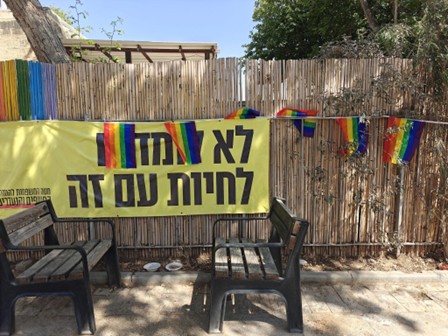
However, the night before the Tel Aviv Pride Parade, we were jolted awake at 3:30 a.m. by the hotel announcement to seek shelter immediately. I wasn’t initially concerned, but as I grabbed my shoes and walked groggily down the stairs, the sight chilled my bones. Locals looked more scared than last time. There was yelling and tense chatter. After a few minutes, I learned that a war with Iran had begun, the parade was cancelled, and the rest of our journey was suddenly full of unknowns.
I could go on for pages about our experiences in the bomb shelters over the next few days. We learned how to prepare after the first few trips: passports ready in a go-bag, shoes by the bedside, travelling with a buddy at all times. Most alerts were overnight, and by day three, we were all sleep deprived and desperate to escape. The streets of Tel Aviv were ruined by broken glass and shattered walls. What should have been a rainbow-filled celebration of love and culture was now a half-empty downtown core with hushed tones and brief moments of attempted levity from the war.
Regardless of the political context, every single citizen we spoke to wished for peace.
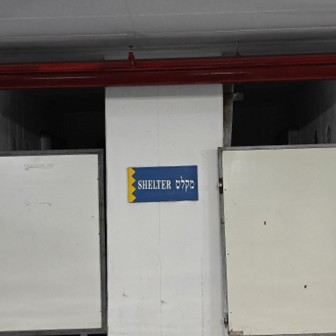
(at left: A photo from our shelter. Photo: Maddy Eisenberg; at right: A photo of a local shop, taken the morning after a rocket hit central Tel Aviv. Photo: Maddy Eisenberg.)
Amidst the whirlwind that was this trip, I remain steadfast in my position: I am glad I decided to go. Don’t get me wrong - there were times when I could not wait to come home. Times I wished that the friends I made there could come with me, because we left them in an unsafe place. However, the stories and knowledge I brought back mean the world to me.
Coming from two minority populations - Jewish and queer - it has become clear how much work Canada must do in order to ensure people with that intersectional background can truly feel safe.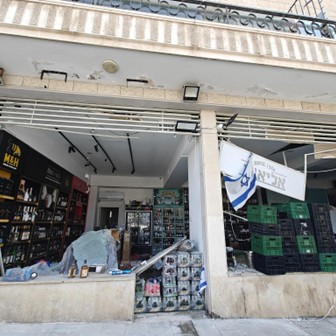

In Canada, I feel safe as a queer person, but not as a Jewish person. In Israel, I felt safe in one hundred percent of myself.
-- Maddy Eisenberg is a member of Federation's Communications and Community Relations Committee
